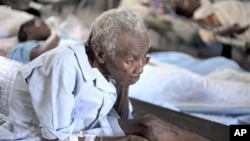Haitian officials say a cholera epidemic is spreading into Port-au-Prince, where health workers confirmed the first case of a person contracting the illness in the capital. Experts fear a recent hurricane may have helped spread the disease, which has killed nearly 600 people.
Haiti's health minister said Tuesday that tests confirmed that a three-year-old boy was found to be infected with cholera in a tent camp in the capital, Port-au-Prince.
Gabriel Timothee said the boy had been taken to a medical clinic last month, where he was treated for severe dehydration from vomiting and diarrhea. Officials said the case was noteworthy because the boy and his family had not left the city in recent months, and they had no contact with people traveling from other regions where cholera is known to be spreading.
The potentially fatal illness was first detected in the Artibonite region of central Haiti last month. Since then, nearly 600 people have died, and hundreds of other cases have been reported across Haiti. Scores of people have been treated for cholera symptoms in the capital, but health experts believe the individuals caught the disease elsewhere before traveling to Port-au-Prince.
Health experts say some of the main sources of cholera infection are public water supplies, such as the Artibonite river, which have been contaminated with fecal matter.
Dr. Jon Andrus is director of the Pan-American Health Organization, which is helping Haiti's government fight the cholera epidemic. He says some of those contaminated rivers were affected by a hurricane that hit Haiti last week.
"We have every reason to expect that widespread flooding has increased the risk of cholera spreading," said Andrus. "The effects of this could become apparent through an upsurge of cases in coming days."
The hurricane raised new concerns about the vulnerability of tent camps, which are housing hundreds of thousands of people who were displaced by the January earthquake in Haiti. People who lost their homes in the quake have little choice but to remain in the camps, in spite of concerns about health and sanitation conditions.
But Andrus says cholera poses the same risk to shanty towns like Cite Soleil, which sits on the edge of the ocean.
"If you put too much focus on one area, like resettlement camps where they have a distribution system and clinical services, then in the slum areas where people live in homes in marginal conditions, we don't want to overlook that," he said. "We are taking a balanced, more comprehensive approach."
Andrus says the Pan-American Health Organization in recent weeks has deployed medical supplies and other equipment to combat cholera in several points around Haiti. The group also is working with Haiti's government and U.S. health officials to expand medical facilities and field clinics that can treat people suffering from symptoms of cholera.
Video footage of Cholera outbreak in Haiti:
.




